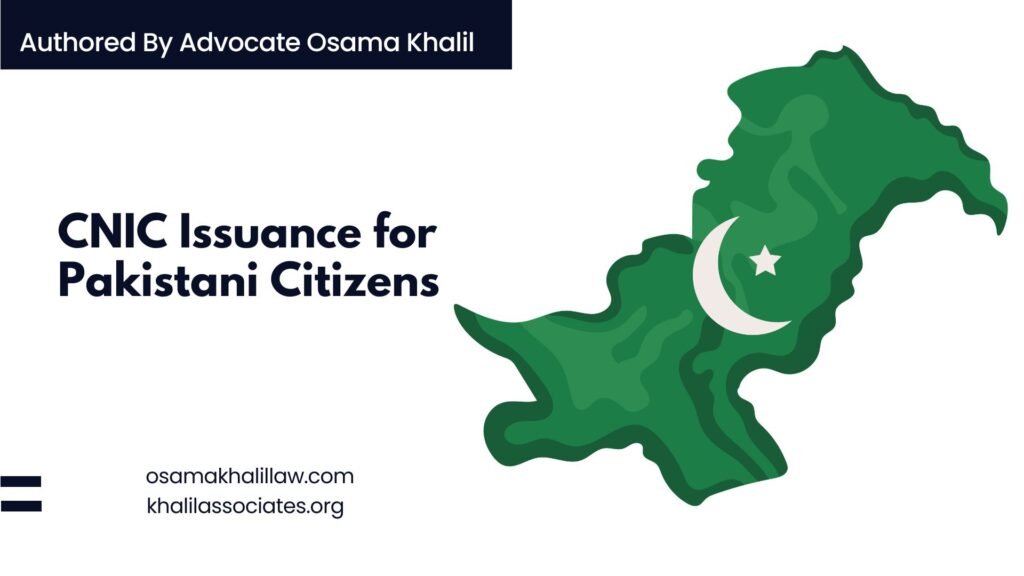
The judgment in Dad Muhammad vs. NADRA (2025 CLC 253) is a significant legal decision that addresses the denial of CNIC issuance for Pakistani citizens. The case revolves around the petitioners’ claim that they are rightful citizens of Pakistan but were unjustly refused Computerized National Identity Cards (CNICs) by the National Database and Registration Authority (NADRA).
The court ruled in favor of the petitioners, emphasizing that they had provided sufficient proof of their Pakistani citizenship through historical land records and other valid documents. This judgment sets an important precedent for individuals facing similar issues with NADRA CNIC denial.
Background of the Case
The petitioners, Dad Muhammad and others, filed a lawsuit against NADRA after their repeated requests for CNIC issuance were rejected. They argued that their family had owned land in Quetta since 1965-1966, proving their long-standing status as Pakistani citizens.
Despite submitting land records, inheritance documents, and other legal proofs, NADRA refused to issue their CNICs. The petitioners then approached the court, seeking a declaration that they were rightful citizens and entitled to their identity cards.
Key Legal Issues in the Case
The main legal question before the court was whether the petitioners had sufficiently proven their Pakistani citizenship to justify CNIC issuance. The court examined several critical aspects.
The petitioners presented land records (Khewet, Khatooni, and Mutation documents) from 1965-1966, showing their family’s ownership of property in Quetta. These documents served as strong evidence of their Pakistani citizenship proof.
NADRA argued that the petitioners should have first exhausted all administrative remedies before approaching the court. However, the court noted that the petitioners had already applied through the NADRA Registration Center (NRC) and even obtained tracking tokens, but their requests were ignored.
The court referred to a 2017 notification by the Ministry of Interior, which stated that individuals could prove their citizenship by submitting documents such as land records before 1979, domicile certificates issued before 1979, government employment records before 1990, and educational certificates or passports issued before 1979. Since the petitioners provided pre-1979 land records, the court ruled that they rightfully qualified for CNIC issuance under Pakistani law.
Court’s Decision and Reasoning
The Balochistan High Court, presided over by Justice Iqbal Ahmed Kasi, overturned the earlier decision of the Additional District Judge-II, Quetta, which had dismissed the petitioners’ case. The High Court held that the petitioners had legally established their Pakistani citizenship through historical land records.
The court found that NADRA’s refusal to issue CNICs was unjustified, given the valid documentation. The 2017 government notification clearly supported the petitioners’ claim. The court emphasized that depriving citizens of CNICs without valid reasons violates constitutional rights and ordered NADRA to issue CNICs to the petitioners immediately.
Implications of the Judgment
This judgment has far-reaching consequences for Pakistani citizens facing CNIC denial. The ruling reinforces that Pakistani citizenship proof cannot be ignored if valid historical documents are provided.
NADRA cannot reject CNIC applications without proper justification, especially when applicants submit pre-1979 records. This legal precedent means individuals denied CNICs can now cite this judgment to demand their rights in court.
What This Means for Other Affected Individuals
If you or someone you know is struggling with NADRA CNIC denial, this case provides a legal roadmap. The first step is to gather historical documents such as land records, domicile certificates, or old passports.
Next, apply through NADRA’s official channels and keep proof of application. If rejected despite submitting valid documents, you can file a lawsuit citing this judgment (2025 CLC 253) to assert your rights.
Conclusion
The Dad Muhammad vs. NADRA (2025 CLC 253) case is a landmark victory for Pakistani citizens denied CNICs unjustly. The court’s decision ensures that individuals with legitimate proof of citizenship cannot be stripped of their rights.
If you face similar issues, consult legal experts and use this judgment to support your case. Citizenship is a constitutional right, and no one should be deprived of it without due process.
Legal Assistance
For professional legal guidance and support in immigration matters, you may contact:
Mr. Osama Khalil
Lawyer & Legal Consultant
📞 Phone: 0316-1829946
📧 Email: contact@osamakhalillaw.com | contact@khalilassociates.org
